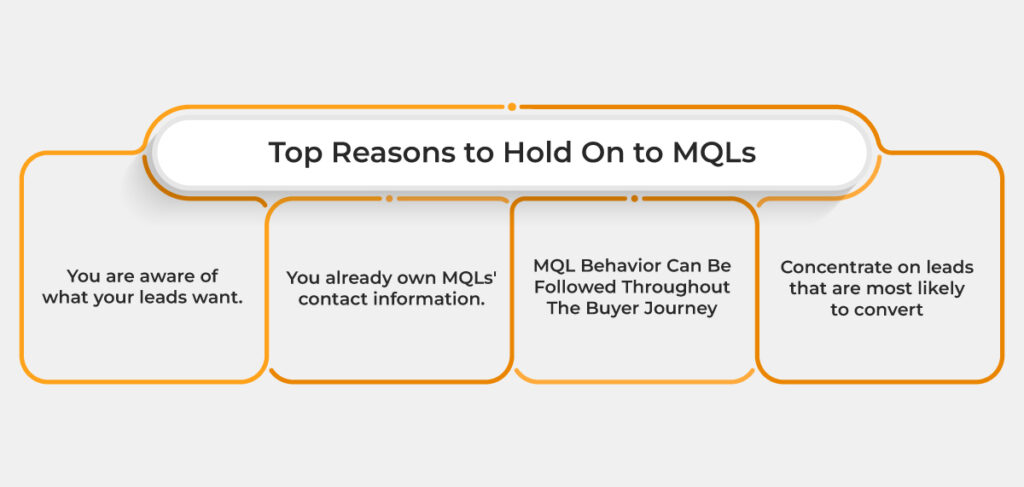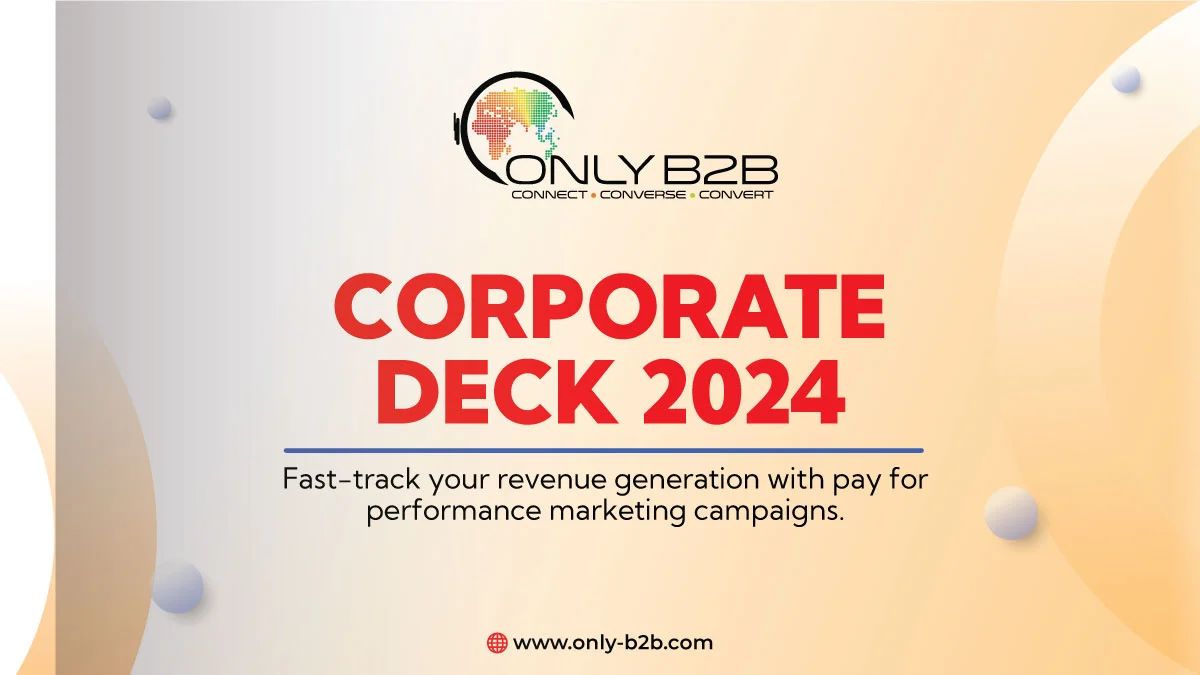
Introduction
Regardless of industry, generating leads is a top goal for B2B businesses. Getting leads is quite simple, but getting marketing-qualified prospects that are likely to convert is more difficult. To achieve this, marketers must invest more time in their research and create an efficient lead generation funnel.
Prospects with a high likelihood of converting into sales leads and then customers are known as MQLs. The requirements for qualifying these leads vary from business to business, but often include tracking activities like:
- examining blog posts
- visiting a website
- product demonstration requests
- enrolling in online courses or webinars
- obtaining information through downloading white papers, books, case studies, or guidelines
- adding things in carts for shopping
- enrolling in email newsletters
MQLs aren’t prepared to work with a sales rep just yet. On the other hand, they have already started the customer journey. They are aware of your company, interested in your products, and starting to recognize that your solutions could be able to solve their issues.
B2B marketers should nurture MQLs after identifying them in order to gain their confidence and persuade them. Content marketing is the key technique used by businesses to cultivate MQLs. Marketers facilitate the conversion of MQLs into customers by nurturing them and not letting them leave.
“If you just serve up the MQLs,” says HubSpot VP of Operations, “then Sales spends less time hunting for those MQLs in their regular process, and more time selling to the real gems you offer, thereby closing more transactions.”
But transforming MQLs into customers may be a time-consuming and laborious process; it is not a one-time, short-term activity. In fact, 95% of MQLs visit your website to do research because they aren’t yet ready to speak with a sales representative.
Since 70% of these leads will eventually make a purchase, you shouldn’t disregard MQLs that aren’t ready to make a purchase just yet. According to a Frost & Sullivan research, the majority of marketers are aware of this fact, with over 70% of them concurring that it often takes three to six months to close agreements with MQLs.
Why, therefore, should B2B marketers hold on to MQLs and refuse to let go even if it takes months for them to convert?
Must Read: MQL to SQL Conversion Rate
The Top 4 Reasons Why, If Your Marketing is Done Properly, MQLs will Eventually Convert are Discussed Below.

1. You are aware of what your leads want.
MQLs are prospects who have already made actions that indicate interest in your offerings, even if they are at the top of the funnel. They could have gone to your website and downloaded information, registered for a webinar or email newsletter, or even gotten in touch with you to ask for further information or a product demonstration. MQL activities, in any event, provide you a hint as to what they are interested in or the product they plan to buy.
They not only suggest interest, but also show that MQL is aware of your solutions and that they are thinking about your products. You may get an indication of what these leads could be looking for by looking at several MQL indicators, such as:
- registering for a software trial or demo
- submitting a form online
- acquiring a price list
- requesting more information about your products and services
- Placing an item in their shopping cart
- Liking a product or service on social media (LinkedIn, Facebook, Instagram, Twitter)
Using this data, you can execute a more focused lead nurturing campaign that improves your prospects’ chances of converting.
2. You already own MQLs’ contact information.
You will have a list of names, contacts, and even job titles of your MQLs if you employ lead capture forms to gather leads. Using this intent data, you may execute campaigns to develop those leads until they are prepared to make a purchase. Email marketing initiatives are among the most effective methods to do this.
The following advice will help you conduct an efficient email campaign:
Sort your MQLs:
Your leads will differ depending on the size of the business, the gender, the age, the job title, the location, the interests, and the stage of the buyer’s journey at which they are at. Your lead nurturing efforts may suffer if you run a single nurturing campaign for all prospects.
Must Read: Conversion of MQLs to SQLs by Integrating Sales and Marketing Efforts
Implement Automation for your email campaigns:
After segregating your leads, automate your email campaigns to improve your email marketing strategies. By automating your marketing, you’ll be less likely to lose out on potential customers. Additionally, it gives you the ability to schedule emails so that your leads get and see them at convenient times. You can also use marketing automation to track customer behavior, so these aren’t the only things it enables you to accomplish. This makes it possible for you to monitor email open rates, click-through rates, and visitor behavior on your website.
Must Read: Do’s and Don’ts of Email Marketing
Make your emails more unique:
When you send customized marketing emails to your leads, automation and segmentation perform effectively. Through the use of dynamic content, you may accomplish this quickly by creating a single email and then customizing various elements according to the recipients. For instance, if you are writing emails for a travel company, keep the message the same but change the header graphic to reflect the location of your leads.
Make your customer buying process unique:
Automate your customer journeys to effectively nurture your leads. The simplest method to achieve this is to identify the activities or behaviors that your prospects take as triggers, then utilize those triggers to send them emails automatically depending on those actions or behaviors.
Must Read: How To Become An Expert At Generating MQLs!
Incorporate a strong call to action:
To increase MQL conversion, finish your emails with a strong call to action.
Use a variety of touchpoints in addition to email advertising to nurture your leads. According to a survey by Aberdeen, a B2B transaction might require over 10 contact points to complete. By varying your touch points and making sure they are pertinent to your leads’ purchasing cycles, you can keep prospects intrigued. Your nurturing programs should contain the following fantastic contact points:
- Blog articles
- Whitepapers
- Calculators
- Contests on social media
- Games
3. MQL Behavior Can Be Followed Throughout The Buyer Journey
MQLs will be at the deliberation stage when you look at the buyer’s journey. They already know what the issue is, and they are evaluating potential remedies to determine which one might work best. Marketers may maintain MQLs’ interest in your brand by carefully observing their behavior throughout this period.
They do this in order to develop very successful lead nurturing strategies. Such leads are nurtured by producing content that is specifically aimed at them, and when the leads are prepared to buy, sales teams are brought in.
Additionally, marketers may assess where MQLs are in the buyer’s cycle and contrast it with the search engine inquiries they are making. MQL search queries during the contemplation stage will be more focused than those at the awareness level.
The more brand-specific the terms MQLs employ, the closer they are to making a choice. B2B marketers may measure how far MQLs are in the consideration stage by looking at how exact their keywords are.
4. Concentrate on leads that are most likely to convert
You must continuously score your MQLs as you nurture them in order to ascertain which leads are most likely to convert and which ones are not. The secret to succeeding in this is keeping track of the activities that MQLs and score them again. This is due to the fact that contacts who frequently visit your website or open your emails are more interested in what you have to say.
In addition, your lead scoring approach has to take points of decay into account. As their score declines over time, you may use this to spot MQLs that don’t stay engaged, which suggests they have stopped being hot leads.
Final Comments
For businesses, generating B2B leads is the most important task. Businesses start the process of turning visitors into leads after attracting visitors. There are several forms of leads; when site visitors begin to take activities that show interest in a company’s products, they become MQLs. MQLs take time to convert even if they are a step closer to converting than marketing leads. However, B2B businesses must be patient and properly nurture them before they can eventually become clients. The factors mentioned above clearly show why you shouldn’t let your MQLs go and what you can do to raise their chances of converting if you are unsure whether your MQLs will convert.
Must Read: How To Become An Expert At Generating MQLs!

Vikas Bhatt is the Co-Founder of ONLY B2B, a premium B2B lead generation company that specializes in helping businesses achieve their growth objectives through targeted marketing & sales campaigns. With 10+ years of experience in the industry, Vikas has a deep understanding of the challenges faced by businesses today and has developed a unique approach to lead generation that has helped clients across a range of industries around the globe. As a thought leader in the B2B marketing community, ONLY B2B specializes in demand generation, content syndication, database services and more.

